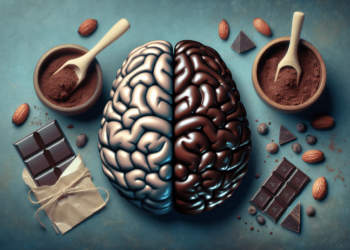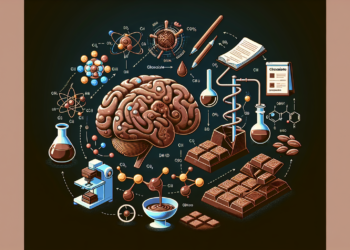You adore the rich, velvety taste of chocolate. Whether it’s a decadent bar or a luscious cake, it never fails to bring a smile to your face. But have you ever wondered if there are any negative effects of indulging in this beloved treat? In this article, we will explore the potential downsides of eating chocolate, from its impact on your waistline to its association with acne breakouts. So, grab a cup of hot cocoa, sit back, and discover if there’s a darker side to your chocolate obsession.
Weight Gain
Excess calorie intake
When it comes to weight gain, one of the negative effects of eating chocolate is its high calorie content. Chocolate, especially in its processed form, can be quite calorie-dense. Consuming excessive amounts of chocolate can lead to a surplus of calories in your diet, which can ultimately contribute to weight gain over time. It’s important to be mindful of portion sizes and incorporate chocolate into a balanced diet to maintain a healthy weight.
High sugar content
Another factor that can contribute to weight gain is the high sugar content in chocolate. Many chocolate products contain added sugars, which can quickly add up and contribute to excessive calorie consumption. Consuming too much sugar can lead to spikes in blood sugar levels followed by crashes, which can increase hunger and cravings for more sugary foods. It’s important to be aware of the sugar content in the chocolate products you consume and opt for healthier alternatives or moderate portion sizes.
Fat accumulation
In addition to its calorie and sugar content, chocolate can also contribute to fat accumulation in the body. While chocolate does contain some healthy fats, especially in dark chocolate, excessive consumption can add up and contribute to overall fat intake. It’s important to remember that moderation is key when it comes to enjoying chocolate and managing weight.
Dental Problems
Tooth decay
One of the negative effects of eating chocolate, particularly if it contains added sugars, is an increased risk of tooth decay. When we consume sugary foods like chocolate, the bacteria in our mouths feed on the sugars and produce acids that attack the tooth enamel. Over time, this acid erosion can lead to cavities and tooth decay. Proper oral hygiene, including regular brushing and flossing, can help mitigate the negative impact of chocolate on dental health.
Cavities
As mentioned earlier, chocolate’s high sugar content can contribute to the formation of cavities. The sugars found in chocolate provide a food source for the bacteria in our mouths, which then produce acids that erode the tooth enamel. If proper dental care isn’t practiced, cavities can form, leading to further oral health issues. It’s essential to brush your teeth after consuming chocolate or opt for sugar-free alternatives.
Enamel erosion
Apart from cavities, chocolate consumption can also contribute to enamel erosion. The acid produced by bacteria when digesting sugars can weaken and wear away the protective outer layer of our teeth. This can lead to tooth sensitivity and increased vulnerability to dental problems. Maintaining good oral hygiene practices and minimizing sugar consumption, including chocolate, can help protect the enamel and maintain oral health.
Gum disease
The negative effects of chocolate on dental health can extend beyond tooth decay and cavities. Excessive chocolate consumption, especially when combined with poor oral hygiene, can also increase the risk of gum disease. Gum disease, also known as periodontal disease, is an infection of the tissues that support the teeth. It can lead to gum inflammation, gum recession, and even tooth loss if left untreated. Maintaining a balanced diet and practicing good oral hygiene are essential for preventing gum disease.

Increase in Blood Sugar Levels
Impact on insulin sensitivity
One of the negative effects of eating chocolate, particularly those high in sugars, is the impact it can have on insulin sensitivity. Insulin is a hormone responsible for regulating blood sugar levels. Consumption of chocolate with high sugar content can lead to a spike in blood sugar levels, putting stress on the body’s insulin response. Over time, this can lead to reduced insulin sensitivity and an increased risk of developing insulin resistance and type 2 diabetes.
Risk for diabetes
As mentioned earlier, the high sugar content in some chocolates can contribute to an increased risk of developing diabetes. Diabetes is a condition characterized by high blood sugar levels. Chronically high consumption of sugary foods, including chocolate, can contribute to weight gain and obesity, which are risk factors for developing type 2 diabetes. It’s important to choose healthier chocolate options, such as dark chocolate with a high cocoa content and lower sugar content, to reduce the risk of developing diabetes.
Acne and Skin Issues
Triggering inflammation
One of the negative effects of eating chocolate, particularly milk chocolate or those with high sugar content, is its potential to trigger inflammation in the body. Inflammation can manifest in various ways, including acne and other skin issues. Some studies suggest that the high glycemic index of chocolate and its potential to increase insulin levels may contribute to skin inflammation and worsen existing skin conditions.
Increased oil production
Another way chocolate can impact the skin is by increasing oil production. Chocolate, especially milk chocolate, contains dairy products that can stimulate oil gland activity, leading to increased sebum production. Excessive sebum production can contribute to oily skin and clogged pores, which can increase the likelihood of acne breakouts.
Clogged pores
In addition to increased oil production, chocolate consumption may also contribute to clogged pores. Chocolate contains certain compounds that can potentially increase the production of keratin, a protein that can accumulate and form plugs in the hair follicles, leading to blackheads and whiteheads. Proper skincare routines, including regular cleansing and exfoliating, can help minimize the negative impact of chocolate on the skin.

Migraines and Headaches
Presence of phenylethylamine
One of the negative effects of eating chocolate, particularly dark chocolate, is its content of phenylethylamine. Phenylethylamine is a compound that can stimulate the release of neurotransmitters in the brain, including dopamine and serotonin. While this can have mood-enhancing effects for some individuals, it can also trigger migraines and headaches in susceptible individuals. It’s important to pay attention to how chocolate affects your body and limit consumption if it consistently triggers migraines or headaches.
Stimulates the release of neurotransmitters
In addition to phenylethylamine, certain compounds found in chocolate, such as caffeine and theobromine, can also stimulate the release of neurotransmitters. While this can have positive effects, such as improved mood and alertness, it can also potentially trigger migraines and headaches in sensitive individuals. It’s essential to be mindful of your body’s response to chocolate and moderate your consumption based on how it affects you personally.
Allergies and Sensitivities
Ingredients like milk or nuts
One of the negative effects of eating chocolate for individuals with allergies or sensitivities is its common ingredients like milk or nuts. Many chocolate products on the market contain milk or may come into contact with nuts during production, making them unsafe for those with allergies or sensitivities. It’s crucial to carefully read ingredient labels and opt for chocolate products that are specifically labeled as allergen-free if you have known allergies or sensitivities.
Histamine release
Another potential negative effect of eating chocolate for individuals with allergies or sensitivities is its potential to trigger the release of histamine in the body. Histamine is a compound released by the immune system during allergic reactions, and it can cause symptoms such as itching, hives, or even anaphylaxis in severe cases. Some people may experience histamine intolerance or sensitivity, and certain compounds in chocolate, such as phenylethylamine or tyramine, can potentially trigger histamine release. If you have known allergies or sensitivities, it’s important to be cautious when consuming chocolate and seek medical advice if needed.
Heartburn and Acid Reflux
Stimulates excess stomach acid
For individuals prone to heartburn or acid reflux, one of the negative effects of eating chocolate is its potential to stimulate excess stomach acid production. Chocolate contains compounds like caffeine and theobromine that can relax the lower esophageal sphincter, the muscle that separates the stomach from the esophagus. When this muscle relaxes, it can allow stomach acid to flow back into the esophagus, leading to symptoms of heartburn and acid reflux.
Relaxation of the esophageal sphincter
In addition to stimulating excess stomach acid production, chocolate can also relax the lower esophageal sphincter, potentially worsening heartburn and acid reflux symptoms. This relaxation of the muscle can make it easier for stomach acid to splash back into the esophagus, causing discomfort and irritation. If you experience heartburn or acid reflux, it may be beneficial to reduce or avoid chocolate consumption to alleviate symptoms.
Sleep Problems
Contains theobromine
One of the negative effects of eating chocolate, particularly dark or semi-sweet chocolate, is its content of theobromine. Theobromine is a compound similar to caffeine that acts as a stimulant and can potentially disrupt sleep patterns. Consuming chocolate, especially closer to bedtime, can make it difficult to fall asleep or maintain a deep, restful sleep. It’s important to be mindful of your personal sensitivity to theobromine and adjust your chocolate consumption accordingly to promote better sleep.
Stimulant effect
The presence of compounds like theobromine and caffeine in chocolate can have a stimulating effect on the central nervous system, leading to increased alertness and decreased sleepiness. For individuals who are sensitive to stimulants, consuming chocolate, especially in the evening, can interfere with falling asleep or maintaining quality sleep. It’s essential to listen to your body and avoid consuming chocolate too close to bedtime if it affects your sleep patterns.
Disrupts sleep patterns
In addition to its stimulant effects, consuming chocolate before bed can also disrupt sleep patterns indirectly. The high sugar content in some chocolate products can cause blood sugar fluctuations throughout the night, potentially leading to disturbances in sleep. Furthermore, the discomfort of heartburn or acid reflux caused by chocolate consumption can also interfere with sleep quality. It’s important to prioritize good sleep hygiene and consider minimizing chocolate intake, particularly close to bedtime, to promote better sleep.
Nutrient Imbalances
Consumed in excess
While chocolate can be enjoyed as a treat, excessive consumption can lead to nutrient imbalances. Chocolate is not a significant source of essential nutrients like vitamins or minerals, and consuming excessive amounts can crowd out more nutritionally dense foods from the diet. It’s important to incorporate chocolate into a balanced diet and ensure you’re still meeting your nutrient needs from other food sources.
Low intake of other essential nutrients
In addition to crowding out more nutrient-dense foods, excessive chocolate consumption can lead to a lower intake of other essential nutrients. For example, if chocolate replaces fruits, vegetables, or protein-rich foods in the diet, there is a risk of inadequate intake of vitamins, minerals, and other important nutrients. Maintaining a varied and balanced diet is key to avoid nutrient deficiencies and maintain overall health.
Addiction and Dependence
Presence of addictive substances
One of the negative effects of eating chocolate is its potential to contain addictive substances. Chocolate contains several compounds, such as sugar, fat, and stimulants like caffeine and theobromine, which can trigger the brain’s reward system and create a sense of pleasure and satisfaction. This can lead to cravings and potentially contribute to addictive eating behaviors, where individuals seek out and consume chocolate compulsively.
Cravings and withdrawal symptoms
The addictive properties of chocolate can also lead to cravings and potential withdrawal symptoms when consumption is reduced or eliminated. Some individuals may rely on chocolate as a source of comfort or to cope with stress, leading to strong cravings when they try to cut back. Additionally, reducing or eliminating chocolate consumption abruptly can result in withdrawal symptoms like irritability, mood swings, or headaches. It’s important to be aware of potential addictive tendencies and practice mindful consumption or seek support if needed.
In conclusion, while chocolate can be a delicious treat enjoyed in moderation, it’s important to be aware of its potential negative effects on various aspects of health. From weight gain and dental problems to increased blood sugar levels and skin issues, chocolate consumption should be balanced and mindful. By understanding and addressing the potential drawbacks, you can still savor the occasional indulgence while prioritizing your overall well-being.





